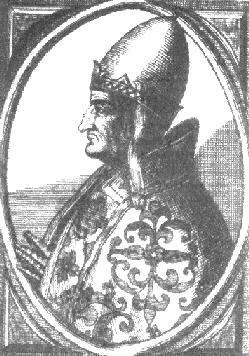 Though the successor of Eugene ruled less than two years, he
earned something of a reputation as an archeologist and an appeaser. On the very
day of Eugene's death the cardinals chose the vicar-general of Rome, Conrad,
cardinal-bishop of Sabina, as his successor. Conrad took the name Anastasius IV.
Conrad was a Roman by birth, probably the nephew of Pope Honorius II.
Though the successor of Eugene ruled less than two years, he
earned something of a reputation as an archeologist and an appeaser. On the very
day of Eugene's death the cardinals chose the vicar-general of Rome, Conrad,
cardinal-bishop of Sabina, as his successor. Conrad took the name Anastasius IV.
Conrad was a Roman by birth, probably the nephew of Pope Honorius II.
He had been a staunch supporter of Innocent II in the struggle
with antipope Anacletus. He enjoyed great prestige, but at the time of his
election was an infirm old man. Anastasius IV was charitable and kind. He
displayed a great interest in archeology. He repaired the Pantheon, made
important excavations under the Lateran, and found the bodies of the famous
martyrs Saints Cyprian and Justina. When Pope Anastasius wrote to the holy nun
Hildegarde asking to see her writings so he could advance in virtue, the mystic
roundly told him that he neglected justice and that he must arouse himself and
save his flock! Anastasius is blamed also by the famous historian Otto of
Freising for appeasing the Emperor Frederick Barbarossa. What happened was this:
Frederick had, without the Pope's consent, translated Wichmann, bishop of
Naumburg, to the see of Magdeburg.
Pope Eugene had refused
to approve of this. Anastasius sent a legate to confer with Frederick about the
matter, but Frederick without much ceremony sent him back to the Pope. The poor
legate died on the way and Frederick then sent an embassy of his own. This
embassy included Wichmann, the very cause of the trouble! Anastasius not only
received the embassy, but he approved of the translation and gave Wichmann the
pallium. This was a resounding victory for the Emperor. It may have had great
influence on his future policy. At any rate, Frederick felt that Anastasius was
a fine pope from his standpoint and hastened preparations for an expedition to
Rome. But Anastasius died before Frederick could arrive, and the pope he was to
deal with was the calm, capable Englishman Hadrian IV. Anastasius died December
3, 1154. He was buried in a porphyry sarcophagus believed to have once sheltered
the remains of St. Helena, mother of Constantine.
Excerpted from "Popes
Through the Ages" by Joseph Brusher, S.J.

